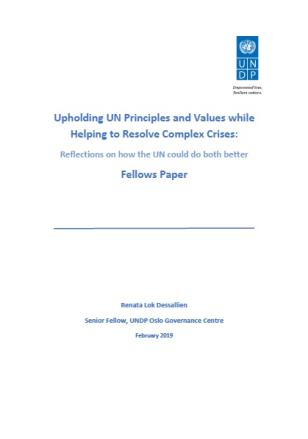Sr. Fellows paper

Sr. Fellows paper
April 1, 2019
The three pillars of the United Nations’ mission – human rights, peace and security, and development – are complementary and mutually reinforcing. In response to serious conflicts, the UN is expected to stand for its principles and, at the same time, constructively engage to help its Member States resolve conflict and lay the foundations for lasting peace and development. If the UN neglects its principles, it becomes morally rudderless; if it ceases to engage constructively with parties to a conflict, it loses the opportunity to bring the full force of its principles and breadth of its competencies to bear in helping resolve conflict, save lives and improve people’s well-being. While conceptually this makes eminent good sense, in practice the UN sometimes falters when trying to walk tall on its two legs.
Considerable analysis has been done on the impact of different UN approaches to conflict resolution. And numerous reflections and reforms have been initiated to render the UN more internally coherent and effective in supporting different dimensions of conflict prevention and resolution. But there has been little analysis to date on the challenges that arise from tensions between different, at times competing, values, mandates and operating cultures within the UN. Yet these challenges constitute a distinct set of issues that influence the UN’s ability to perform in complex crises and thus merit examination.
This paper examines the origins of these internal UN tensions and how they can influence the organisation’s performance in complex conflicts. While it draws on experience in non-UN mission contexts, where the UN System is often at its most vulnerable – exposed to complex demands with only the normal country set up – many of the findings are also relevant for UN mission settings. The paper is written for an audience with knowledge of how the UN operates in response to complex crises.

 Locations
Locations




